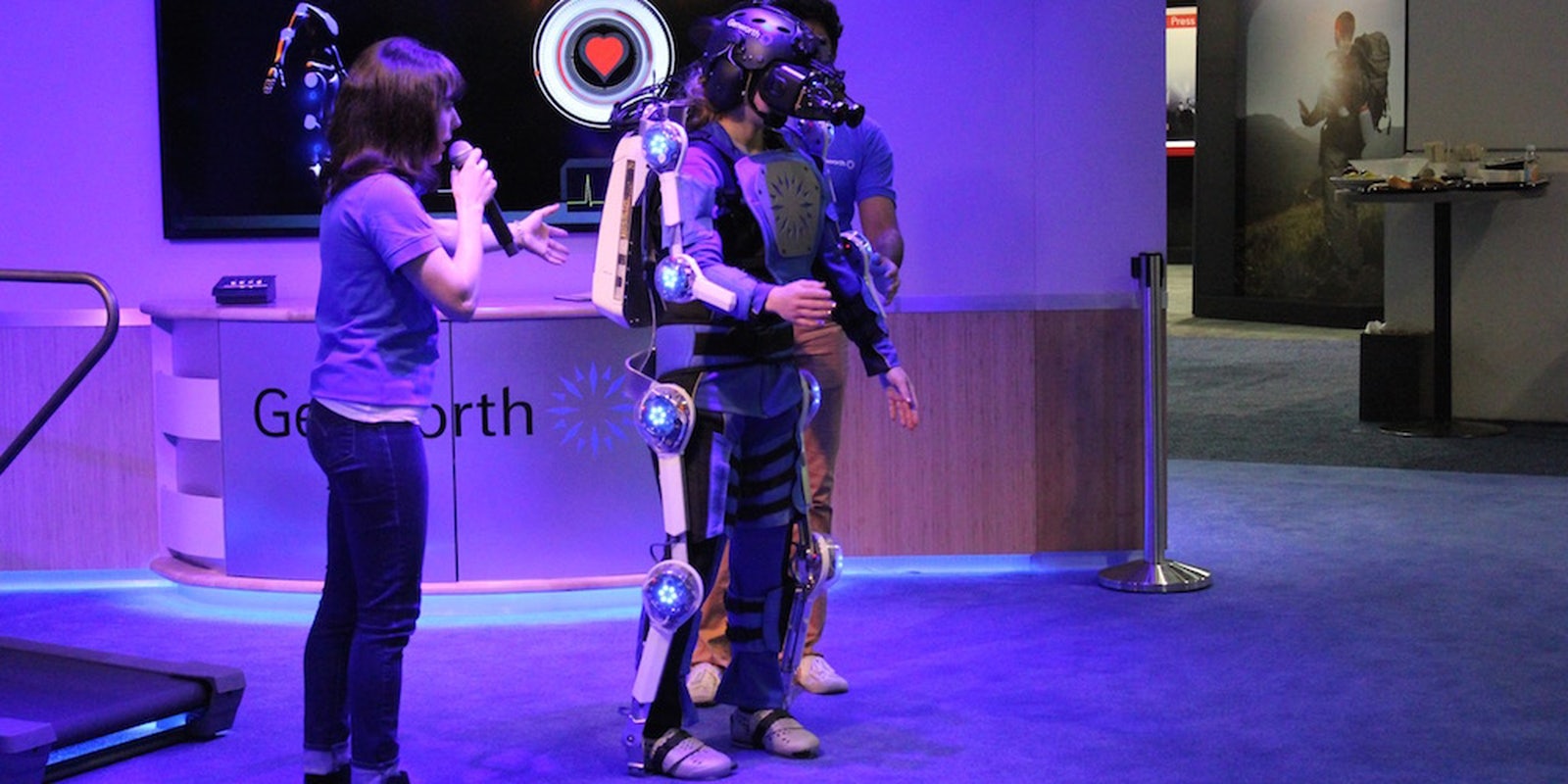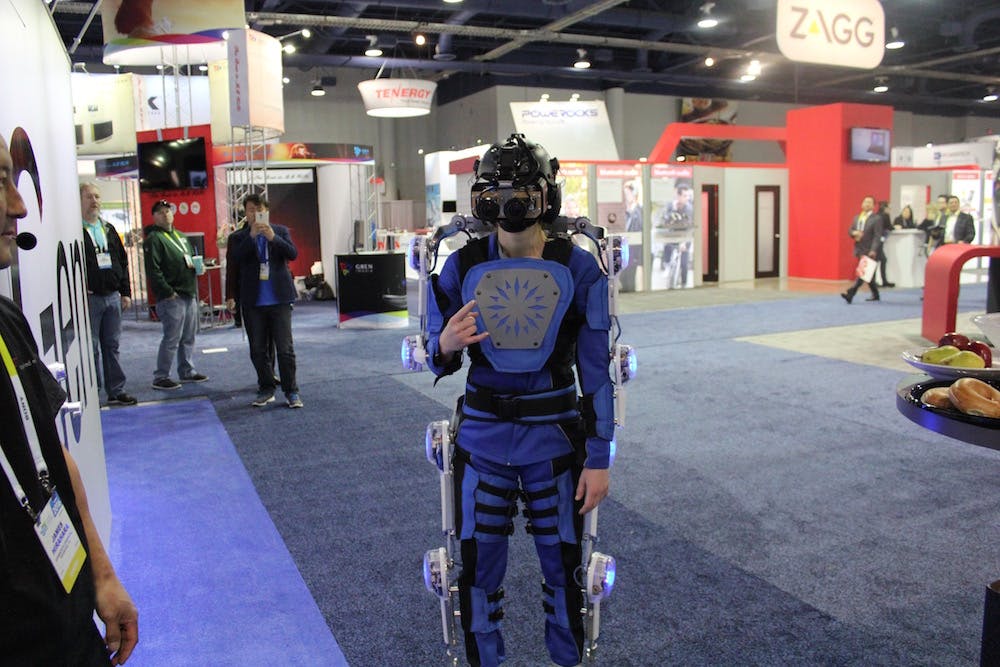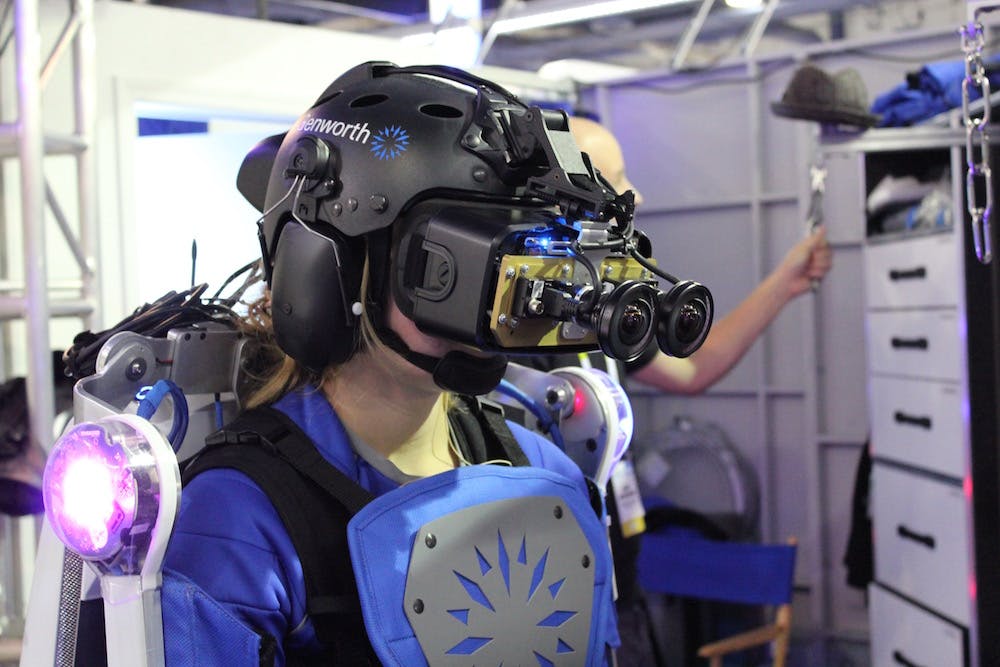When the full weight of the Genworth R70i exoskeleton was released onto my body, I felt my knees buckle and an uncomfortable weight spread evenly across my limbs and back. But after I took a few careful steps around the room to get accustomed to the robotic device, I began to feel less like a pack mule and more like someone experiencing the affects of aging without actually getting any older.
The R70i is a robotic exoskeleton and augmented reality device developed by Applied Minds for Virginia-based life insurance company Genworth that simulates the effects of growing older. I tried out the device at CES on Friday as part of the company’s morning demonstration.
Being old was exhausting. And while it feels incredibly cruel to say, the fact of the matter is, I didn’t like it. My body wasn’t working like it was supposed to, and that is a frightening feeling.
What happens to me when I can’t run off the stress of a long work day? Does feeling helpless come with the loss of physical motion, or is that something I experienced because I was dropped into a simulated environment with no real idea of what to expect?
I thought about my grandmother who walked a mile every day, rain or shine, until she was 85. What did her body feel like, and did it feel like mine in this weird pretend suit?
Virtual reality systems are used to generate empathy in viewers, from documentaries to simulated psychological experiences. I’ve tried some of these before, including a schizophrenia simulator, but without fully immersive and haptic technology, they didn’t provide an experience as real as Genworth’s aging suit.
The suit weighs 40 pounds and just putting it on simulates the affects of aging, like weight gain and loss of muscle mass and bone density. My body acclimated to the extra weight after a few minutes of walking around inside the suit, but the discomfort of carrying around more body weight lingered.
To further mimic physical changes the human body goes through as it gets older, the R70i comes with a backpack assembly that contains servo controllers, computers, and digital processors that send signals to and from a head-mounted Oculus headset, connected headphones, and brakes that are located on the joints of the exoskeleton. Someone sends commands to the suit, and the changes happen in real time to simulate vision loss, hearing loss, arthritis, and other physical limitations.
The person controlling the suit can mimic disorders like glaucoma, macular degeneration, and cataracts; you look out into the world through a modified lens. I experienced blurred vision in both the middle of my field of vision and in my blindspots, and blindness in one eye. The presenter asked me to imagine what it would be like to drive around like this, and it forced me to think about the safety concerns associated with vision impairment that can make seniors more dangerous drivers.
While the vision impairment wasn’t all that uncomfortable, the hearing modification was more off-putting, mostly because I found myself much more affected by sounds. Simulated tinnitus rang in my ears, and made it difficult to hear what the presenter was saying. The headphones mostly muted outside noise, but there were speakers within the headphones so I could interact with the controllers and hear the simulated impairment.
The most intense and restrictive feeling came when the controller began to apply pressure to the joint brakes, synthetically creating the affects of rheumatoid arthritis, limping, and what my legs might feel like after a knee or hip replacement. It’s not painful, per se, but when my leg movement was severely restricted, it felt like I was walking through a giant bowl of glue.
When they put pressure on my arms to simulate rheumatoid arthritis, I found it almost impossible to raise or move them, as the electronics at my joints prevented the simple motion of climbing a rope.
Walking and moving my arms up and down are activities I don’t think about on a regular basis. I’m very active and mostly healthy, so I breeze through fundamental motions on autopilot. But when the suit made me feel the restriction in my legs, a wave of anxiety washed over me, and I began to feel concerned about my future health, and started wondering who in my life has to walk like that every day.
My reaction to being strapped inside an aging suit was exactly what Genworth hopes people feel—empathy for our elders while confronting our own mortality.
As a life insurance company, raising awareness of health concerns and how to prevent them is part of their business, and that includes showing children and grandchildren of aging individuals what their loved ones might be feeling. The company is taking its two functioning R70i exoskeletons on tour this year so more people can try them out.
I could feel what it was like to be old, and as the presenter asked me with each new challenge “Can you imagine living like this day-to-day?” it felt cold to say, “No, I have no idea how hard this must be, and it’s not an enjoyable feeling.”
The consumer devices and apps that littered the CES show floor ranged from music accessories to phone chargers to things I never quite figured out the point of. I spent four days wandering around the Las Vegas strip complaining about how tired I was, walking from interviews to happy hours to technology demonstrations.
And then I stepped into an exoskeleton meant to make you feel something beyond your current position in life, and it reminded me I had nothing at all to complain about, because there are struggles much realer than mine.
Photo by AJ Dellinger




